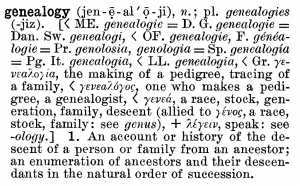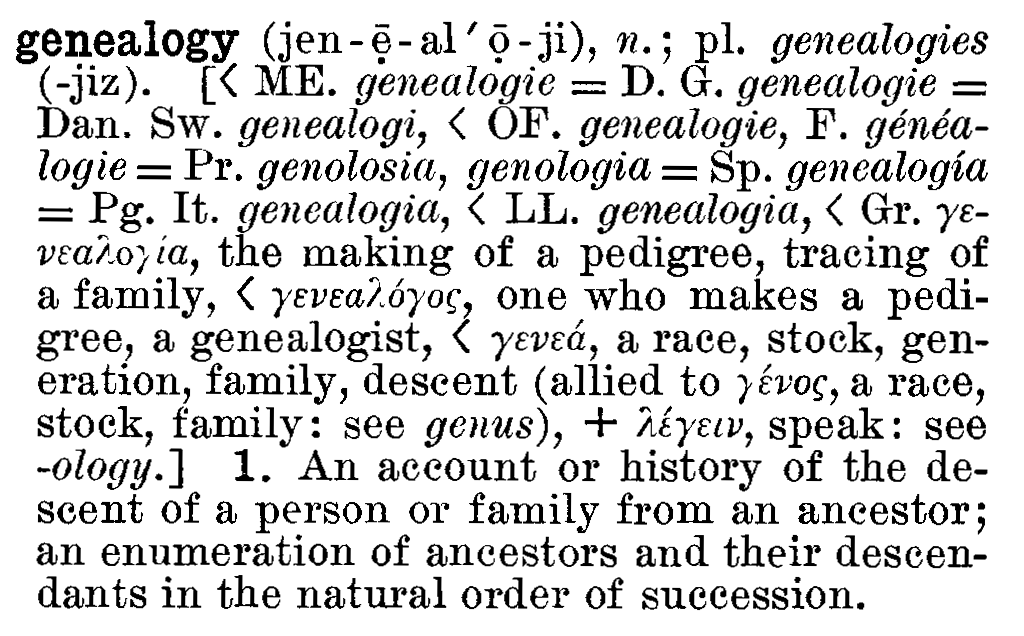
I’ve been blogging about genealogy for a few years on my other blog, Blood and Frogs: Jewish Genealogy and More. I’ve found that when I go off-topic too much some readers sometimes get annoyed, so I’m starting this new blog as a way to document my combined interest in the fields of Lexicography, Genealogy and Technology.
Merriam-Webster defines these three terms as:
Lexicography
1 : the editing or making of a dictionary
2 : the principles and practices of dictionary making
Genealogy
1 : an account of the descent of a person, family, or group from an ancestor or from older forms
2 : regular descent of a person, family, or group of organisms from a progenitor or older form : pedigree
3 : the study of family pedigrees
4 : an account of the origin and historical development of something
Technology
1 a : the practical application of knowledge especially in a particular area : engineering 2 <medical technology>
b : a capability given by the practical application of knowledge <a car’s fuel-saving technology>
2 : a manner of accomplishing a task especially using technical processes, methods, or knowledge <new technologies for information storage>
3 : the specialized aspects of a particular field of endeavor<educational technology>
I have a goal in combining these interests, which is to publish a dictionary of Jewish first names. While I’ve toyed with this idea for many years, and have been collecting data towards that end for some time, I have not yet begun to compile anything remotely looking like a dictionary. That’s because the art of compiling a dictionary, lexicography, is not something one reads a Dummies book about and then jumps into. If anything, lexicography is something of an arcane art. The big dictionary publishers like Merriam-Webster in the US and Oxford in the UK train their employees directly, and while there is some outside training available, the total number of lexicographers worldwide is small, and the knowledge is not widespread.
You might be thinking that a dictionary of names actually falls under a fourth term:
Onomastics
1 a : the science or study of the origins and forms of words especially as used in a specialized field
b : the science or study of the origin and forms of proper names of persons or places
2 : the system underlying the formation and use of words especially for proper names or of words used in a specialized field
Technically that’s true, but I personally associate the term Onomastics with a scientific study of names, and I make no claims to my own study being scientific, even if I plan on using some scientific techniques for processing the data I collect.
Lexicography has undergone tremendous upheavals in recent decades, first through the introduction of computerized lexicography using massive electronic corpuses, and second through the ongoing elimination of the printed dictionary as the primary method of accessing dictionary content. Another shift that has been a long time coming, is the shift from prescriptive to descriptive dictionaries. While dictionaries in the 18th and 19th century tried to define the proper usage of all words in the English language, the more recent descriptive dictionaries, exemplified by Webster’s Third International which came out in 1961, describe the current usage of words instead of trying to explain the proper usage of the terms.
Let’s take a look at all three changes in reference to my work here.
The concept of an electronic corpus, which collects large amounts of source literature and allows quick searching of real usage of specific words, is something that can be very useful for researching names as well. Certainly in terms of Jewish names, just making the bible and other Jewish texts searchable by name is something that is very useful. The problem with the traditional corpus is the assumption that all data is based on original texts (i.e. throwing in massive databases of written works such as books, newspapers, magazines, etc.). I’ve spent a number of years developing my own curated sources on names, that are already in database form. Integrating those into a traditional corpus is not so simple, and how I use my current research in conjunction with building a corpus is something that will take some time to work out.
As a fan of printed books, it is of course sad to see the continual shift to electronic publishing for everything from novels to magazines to newspapers to dictionaries. In the case of encyclopedias, the general purpose encyclopedia has essentially been eliminated by the rise of Wikipedia. People read their books on the their Kindles, peruse their magazines on their iPads, and read their news on the web. Print dictionaries are still selling, but like printed encyclopedias which are almost extinct (except specialist encyclopedias) is it reasonable to expect that print dictionaries won’t similarly disappear? Certainly there is a place for well curated dictionaries, even online, but the perceived value of one dictionary versus the value of another is lowering all the time. People just search for definitions online, or use the built-in dictionary look-ups in their operating system. On Mac OS X, for example, any word can be selected, and with a simple right-click, a menu item allows the user to look up the word in a dictionary, a thesaurus and Wikipedia simultaneously. Who provides the definitions in this built-in dictionary and thesaurus? I don’t even know. Luckily for me, my pursuit is very specialist, so I think there’s more time for me to publish a printed book. I can also publish the dictionary on Kindle, as an iBook, or as an iPad app.
The concept of prescriptive and descriptive dictionaries is an interesting one, and certainly has a lot of relevance to name dictionaries. In some countries (as I described a bit tongue-in-cheek in a recent article on my other blog) parents can only name their children according to very specific rules, and in some cases from specific lists of approved names. You might consider that the prescriptive approach. A book that attempted to choose what was an appropriate name, and what wasn’t, would be prescriptive. A book that just documented what names are being chosen, would be descriptive.
One of the goals of the dictionary will be to look at the usage of Jewish given names over the past century, and how they have changed. This can be very useful for genealogists who might know the name of a relative in one country, but lost track of them when they moved to another. Jews who moved from Eastern Europe to the United States and Israel in the past century many times changed their names, and trying to figure out what their new names became can be a guessing game. Hopefully the work I am doing will be make that an educated guessing game.
So here this effort begins. I will be documenting my efforts to build a name corpus, to learn how to craft a dictionary, to figure out the intricacies of taking the final data and exporting them to a publishing program like Adobe InDesign for printing, etc. Hopefully other people out there will find some of my efforts useful for their own projects.

3 responses to “Combining interests in Lexicography, Genealogy and Technology”
[…] Lexigenealogy, the new blog by the creator of Blood and Frogs, might have an opinion on […]
[…] For more information about the impetus for starting this new blog, see my first post there Combining interests in Lexicography, Genealogy and Technology.I will continue to write for both blogs, but will keep the more technical and Lexicography-oriented […]
[…] I’ve started a second blog, called Lexigenealogy. This new blog is about my convergence of interests into Lexicography, Genealogy and Technology. I will be using the new blog to look into what it takes to build a dictionary of names, from the technology needed to organize research, to how to properly format it for printing. This will be a long process, and I hope people will find it interesting. For more information about the impetus for starting this new blog, see my first post there Combining interests in Lexicography, Genealogy and Technology. […]